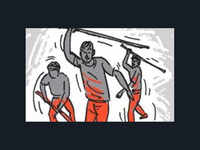In a first, 2-day-old operated through robotic surgery
Shimona Kanwar | TNN | Feb 20, 2019, 06:46 IST The baby after being operated upon at the PGI
The baby after being operated upon at the PGICHANDIGARH: For the first time in Asia, a two-day-old baby weighing 2.5kg was successfully operated upon using robotic facility at the PGI. Unlike conventional surgery, the baby was treated for missing food pipe without opening the chest and instead making small holes for the instruments to enter.
“Not only there was no requirement of blood transfusion, the days of hospitalisation was cut short from a month to a week,” said Ram Samujh, head of the paediatric surgery department, PGI.
The baby was operated upon by a team of paediatric surgeons headed by Dr Ravi Kanojia on February 2 and was discharged after a week. The baby was born without a food pipe and was unable to take his feeds.
“This condition is known as oesophageal atresia. Opening the chest in a small baby is both stressful and traumatic. Conventionally, these babies are operated by opening their chest within first two-three days after birth. This is a very advanced surgery in which the oesophageal reconstruction is done so early in life,” said Dr Kanojia.
The father of the baby works as a security guard in the city. “For such patients, such world-class facility of robotic surgery costs Rs 10,000, which is two times that of a conventional surgery. But as it reduces days of admission and chances of infection, the amount comes to almost the same,” said Dr Kanojia. “It took 90 minutes to operate, which is 15-20 minutes more than the conventional one. But time doesn’t matter as it saves the baby from the trauma of opening the chest,” he added.
The PGI sees 250 cases of missing food pipe in a year, which is one of the largest anywhere in Asia. “There are various modalities like open and laparoscopic surgeries. The surgical team has used robotic surgery to repair this difficult condition for the first time,” said Ram.
“We have been doing robotic surgery since a year and some 50 cases have been done. This includes obstruction in kidney, cysts in abdomen, etc,” said Dr Kanojia.
“Not only there was no requirement of blood transfusion, the days of hospitalisation was cut short from a month to a week,” said Ram Samujh, head of the paediatric surgery department, PGI.
The baby was operated upon by a team of paediatric surgeons headed by Dr Ravi Kanojia on February 2 and was discharged after a week. The baby was born without a food pipe and was unable to take his feeds.
“This condition is known as oesophageal atresia. Opening the chest in a small baby is both stressful and traumatic. Conventionally, these babies are operated by opening their chest within first two-three days after birth. This is a very advanced surgery in which the oesophageal reconstruction is done so early in life,” said Dr Kanojia.
The father of the baby works as a security guard in the city. “For such patients, such world-class facility of robotic surgery costs Rs 10,000, which is two times that of a conventional surgery. But as it reduces days of admission and chances of infection, the amount comes to almost the same,” said Dr Kanojia. “It took 90 minutes to operate, which is 15-20 minutes more than the conventional one. But time doesn’t matter as it saves the baby from the trauma of opening the chest,” he added.
The PGI sees 250 cases of missing food pipe in a year, which is one of the largest anywhere in Asia. “There are various modalities like open and laparoscopic surgeries. The surgical team has used robotic surgery to repair this difficult condition for the first time,” said Ram.
“We have been doing robotic surgery since a year and some 50 cases have been done. This includes obstruction in kidney, cysts in abdomen, etc,” said Dr Kanojia.



































All Comments ()+^ Back to Top
Refrain from posting comments that are obscene, defamatory or inflammatory, and do not indulge in personal attacks, name calling or inciting hatred against any community. Help us delete comments that do not follow these guidelines by marking them offensive. Let's work together to keep the conversation civil.
HIDE